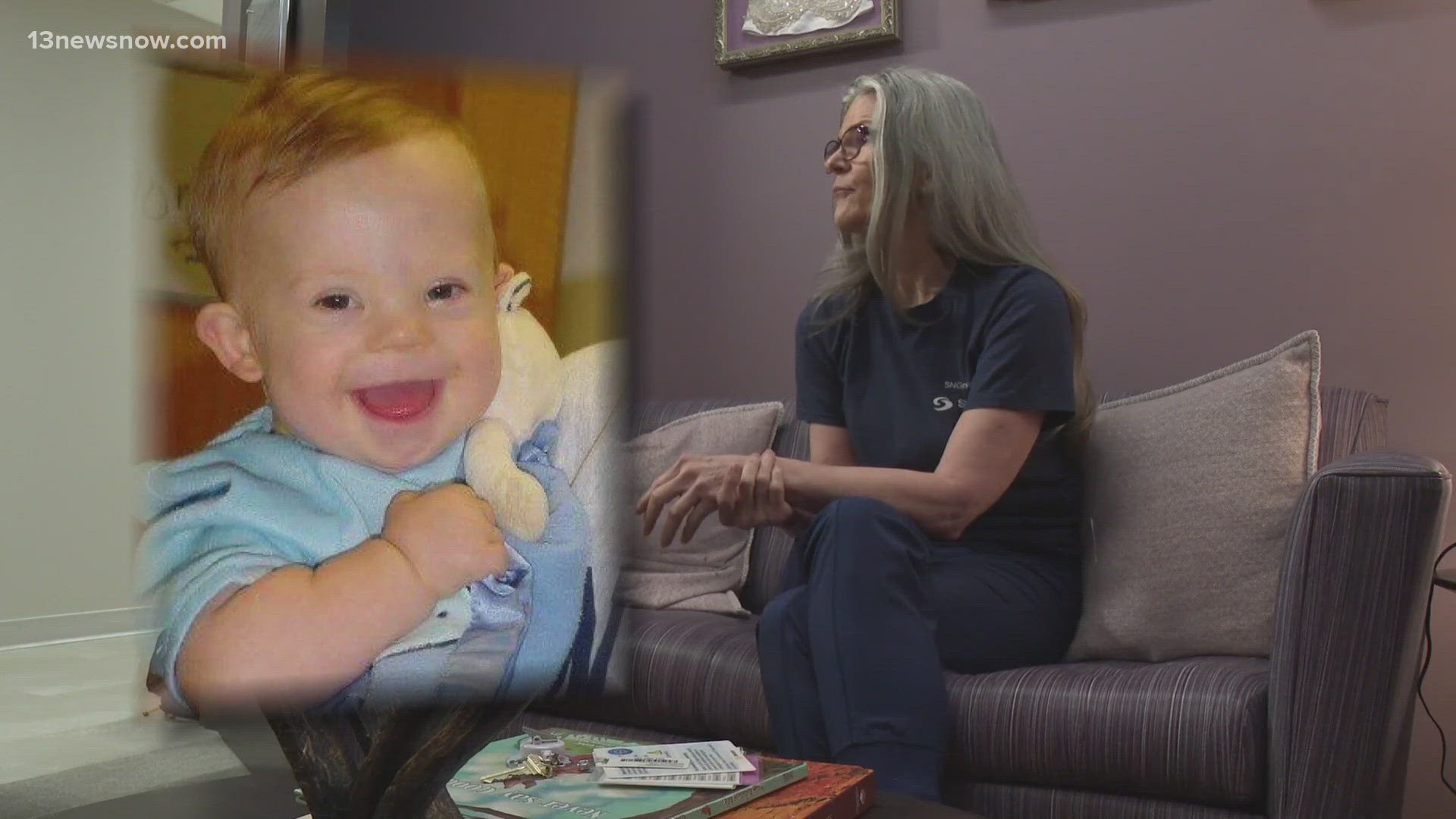NORFOLK, Va. — The Family Maternity Center at Sentara Norfolk General Hospital includes Neonatal Intensive Care, Mother-Baby, Antepartum Care, and Labor & Delivery units. And, since 2019, it's also where grieving families find the Butterfly Room.
The first-of-its-kind private bereavement space for Sentara Health was built after a $50,000 donation from Kennedy's Angel Gowns, a nonprofit that creates infant burial garments from donated wedding gowns.
"This room is a safe haven for our families who've had a loss. People who are visiting them can stay in this room," said Deborah 'Deb' Floyd, the hospital's perinatal bereavement coordinator. The room is right next to her office.
"We keep it kind of subdued, sensory-conscious, and they're kind of away from the hustle and bustle of the very positive waiting room."
She even invites doctors, nurses and other hospital staff members to use the Butterfly Room when they just need a quiet space.
"Sometimes, when there's a rough delivery or an outcome that didn't go the way we had hoped," Floyd said, "they can come in here and take five and then, go back to work."
Floyd said she wishes something like this was around twenty years ago.
Her son, Tommy Dougherty, was born on Oct. 27, 2003.
"We found out that he had Down syndrome and a congenital heart defect," said Floyd. "After he was born, we just needed him to grow a little bit so he could have his surgery. And, you say open heart surgery, like, oh yeah, there's a big possibility that a child won't survive that. But in this area, it was a great team. They did this surgery all the time."
"We just didn't think it was [going to] happen, you know, to him," she explained. "And he didn't survive his surgery."
Tommy passed away on Oct. 13, 2004, about two weeks shy of his first birthday.
Floyd said her world completely changed that day.
"I [had] been a Labor and Delivery nurse for over thirty years," Floyd said. "Coming back to work, it was hard at first to work with families who had a loss [be]cause it brought me right back to that day."
But in 2017, Floyd decided to make a major career change and become a perinatal bereavement coordinator. She said the transition into her new role came naturally.
"Something switched in my healing to be with those families," Floyd said. "There's just this sense of being there for them, getting to know who they are and what this precious baby meant to them, [be]cause everyone's different. And then, taking care of them as they need us to take care of them, and support them on their journey."
Floyd said she just understands what parents need in those moments.
"I go in the room, and I make sure I don't have distractions. I don't [want to] try to go see them if I have a meeting in fifteen minutes [be]cause I want to be in there as long as they need me to be in there," Floyd said. "Sometimes, just sit[ting] in there, be[ing] with them, sometimes just sitting there in silence as they're processing it, questions will come up that they can ask, or just to share their story. If they cry, that's good because that means that they're expressing themselves and they're not keeping it in. So, I just want to create that place for them."
Floyd's story, however, is something she rarely discusses with her patients.
"If they come right out and ask, then I'll share Tommy's story," Floyd said. "But when I go in there, it's about them."
But she said she still draws from the light that her son, Tommy, brought into her life as she helps families go through their darkest hour.
"I feel so much closer to him doing this," Floyd said. "[Be]cause people will say, 'How do you do what you do?' I can't explain that, really. It's hard to explain that. But I feel it's, you're with someone who's gone through something so difficult, and you get to be there and help them through that, that gives me meaning. If I had to lose him, you know, if I have to be here without him, it has to have meaning."
Floyd said she also feels closer to Tommy when she sees a red cardinal.
"When Tommy passed away... our routine was to go to church, and then we would go visit him," Floyd said. "As we were getting ready to leave, this little red bird came right by us. And that was, like, 'Yeah, I'm here'... And so, ever since then, whenever I see a red cardinal, every time, I'm like, 'Yeah, I see you. I know you're here with me.'"
About three years after he died, Floyd and her family officially adopted a 4-year-old girl from an orphanage in Ukraine. Anya Dougherty was born with Down syndrome, like Tommy. Floyd said Anya would have spent the rest of her life in a mental institution if she had not been adopted.
"We wanted to give someone who didn't have a family a chance," Floyd said. "Tommy's life gave Anya a new one."
Sentara Norfolk General Hospital has several cooling devices, including Cenotaph Cradles and Cuddle Cots, that can help preserve babies for several days after they have passed away. The devices look similar to cradles used in a traditional nursery and can help parents feel a sense of normalcy.
"We just have, as human beings, such a strong need to protect our children and to care for them, and death doesn't sever that," Floyd said. "You still want to hold your baby and be with your baby. And you know that, you know, you can't, but having that precious time is just really valuable memories to hold onto. And it does help with grief if you can say hello before you say goodbye."
Floyd said 15 to 17 families at Sentara Norfolk General Hospital use the cooling devices for their babies each month.

